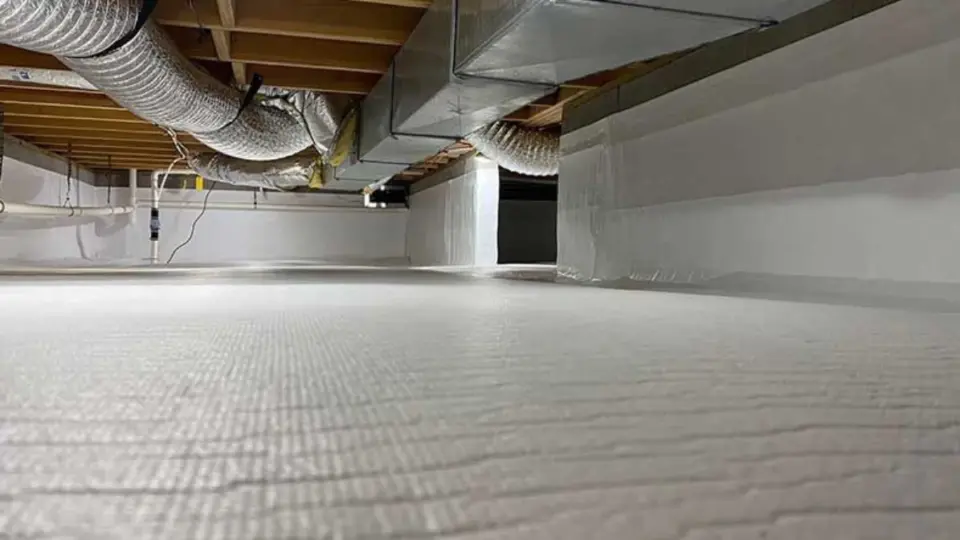
A musty smell in the basement can be a persistent and unpleasant problem for homeowners. This odor not only affects the comfort of your living space but can also be a sign of underlying issues. Addressing the source of these odors often involves implementing effective basement waterproofing solutions.
To understand how waterproofing can eliminate these musty smells, it’s important to first identify the common causes, explore how waterproofing helps, and examine the methods available to tackle the problem.
What Are The Common Causes Of Musty Odors In Basements?
Musty odors in basements are typically a result of excess moisture and poor ventilation. Given that basements are located below ground level, they are especially vulnerable to moisture problems. Here’s a closer look at the common causes:
- High Humidity Levels: Basements often have higher humidity levels because they are cooler and less ventilated than other parts of the house. High humidity creates a damp environment that supports the growth of mold and mildew.
- Water Seepage: Water can seep through basement walls and floors due to various reasons, including heavy rainfall or improper grading around the foundation. This seepage introduces moisture directly into the basement, exacerbating the problem.
- Inadequate Drainage Systems: If your home’s drainage systems, such as gutters and downspouts, are not functioning properly, water can accumulate around the foundation and eventually seep into the basement. Ineffective drainage systems fail to redirect water away from the home, leading to moisture issues.
- Leaky Pipes: Pipes in or near the basement that are leaky can drip and create localized areas of dampness. This moisture can contribute to the musty smell if not addressed promptly.
- Faulty Gutters: Gutters that are clogged or damaged can cause water to overflow and flow towards the basement instead of being directed away from the house.
- Groundwater Issues: Groundwater that isn’t properly managed can seep through cracks or gaps in the foundation walls. This groundwater often accumulates around the basement, increasing moisture levels.
- Lack of Ventilation: Poor ventilation in basements prevents moist air from escaping, leading to a buildup of humidity. Without proper airflow, damp conditions persist, allowing mold and mildew to thrive and release musty-smelling spores into the air.
Addressing these issues through proper waterproofing and ventilation can significantly reduce or eliminate musty odors in your basement.
How Does Basement Waterproofing Help In Eliminating Musty Odors?
Basement waterproofing addresses the root causes of moisture problems, which are crucial in eliminating musty odors. By preventing water from entering the basement, waterproofing techniques reduce the humidity levels and minimize the conditions that allow mold and mildew to grow.
Effective waterproofing starts with identifying and sealing any cracks in the foundation. These cracks can be entry points for water, so sealing them helps prevent moisture from seeping into the basement. Additionally, installing a proper drainage system around the foundation can redirect water away from the house. French drains and sump pumps are commonly used in this regard. A French drain collects and channels water away from the foundation, while a sump pump removes water that collects in the sump basin.
Incorporating a vapor barrier is another important aspect of basement waterproofing. This barrier, typically made from plastic or foil, is installed on the floors and walls to prevent moisture from penetrating the basement. By creating a barrier between the ground and the interior of the basement, it significantly reduces the amount of moisture that can contribute to musty odors.
Proper ventilation is also a key component. Adding vents or installing an air exchanger can help improve airflow and reduce humidity levels in the basement. Adequate ventilation ensures that any remaining moisture can evaporate more effectively, further combating the growth of mold and mildew.
What Types Of Waterproofing Methods Are Effective For Basements With Odor Issues?
There are several waterproofing methods that can be particularly effective in addressing basement odors. Which way to use depends on the problems and how bad the moisture problems are.
To waterproof the outside of a building, you have to dig around the base and put a waterproof coating on the outside walls. It works very well to keep water from getting into the base with this method. Additionally, installing exterior drains helps manage groundwater and prevent water from pooling around the foundation.
Interior waterproofing methods, on the other hand, focus on addressing issues from the inside of the basement. One common approach is to install an interior drainage system, which includes a perimeter drain that collects water and directs it to a sump pump. This method is particularly useful in preventing water from accumulating on the basement floor and walls.
Another effective interior method is the installation of a dehumidifier. Dehumidifiers help reduce the overall humidity levels in the basement, making it less conducive to mold and mildew growth. Combining a dehumidifier with other waterproofing measures can provide a comprehensive solution to musty odors.
For basements that experience severe moisture issues, a combination of both exterior and interior waterproofing methods may be necessary. This approach addresses the problem from multiple angles and ensures that all potential sources of moisture are managed effectively.
How Long Does It Typically Take To Notice An Improvement In Basement Odors After Waterproofing?
The time it takes to notice an improvement in basement odors after implementing waterproofing measures can vary depending on several factors. In many cases, homeowners may start to see a reduction in musty smells within a few weeks of completing the waterproofing work. This is particularly true if the source of the odor was primarily due to recent water intrusion or high humidity levels.
However, if the basement has been experiencing moisture issues for a long time, it might take a bit longer to fully eliminate the odor. In such cases, it’s essential to allow time for the basement to dry out completely. The effectiveness of the waterproofing methods and the extent of the moisture damage will influence how quickly improvements are noticed.
It’s also important to continue monitoring the basement after waterproofing to ensure that the problem does not return. Regular maintenance, such as checking for leaks and ensuring that the drainage system remains functional, can help prevent future moisture issues and ensure that the musty odors do not reappear.
Basement waterproofing is a crucial step in addressing musty odors caused by excess moisture. By implementing the right waterproofing methods and addressing the root causes of moisture problems, homeowners can effectively eliminate these unpleasant smells and improve the overall environment of their basements.
Why Freedom Crawlspace Services is Your Best Choice for Basement Waterproofing
At Freedom CrawlSpace Services, we understand the complexities involved in effectively addressing musty odors and moisture issues in basements. Our team of experts specializes in a comprehensive range of waterproofing solutions tailored to meet your specific needs. We begin with a thorough assessment of your basement’s unique conditions, identifying any potential sources of moisture and structural vulnerabilities.
Our approach combines advanced technology with proven techniques. We offer state-of-the-art waterproofing systems, including high-quality vapor barriers, efficient sump pumps, and innovative drainage solutions. Our skilled technicians ensure that every installation is done with precision and care, optimizing the effectiveness of our solutions.
By choosing Freedom CrawlSpace Services, you invest in long-lasting peace of mind and a healthier, odor-free basement. Let us help you create a dry, comfortable environment that you can enjoy for years to come.
Frequently Asked Questions About Basement Waterproofing
What Is the Cost of Basement Waterproofing?
How much it costs to waterproof a basement depends on how bad the problem is and what solutions are picked. Most of the time, homeowners pay between $3,000 and $10,000. In this range, simple fixes like sealing cracks and putting up a vapor barrier might be near the bottom. The more extensive jobs that include waterproofing the outside and installing high-tech drainage systems will cost more. It’s important to get a price that is specific to your needs.
How Long Does Waterproofing Last?
When installed correctly, most basement waterproofing systems can last 10 to 20 years or more. Regular maintenance and inspections can help prolong the effectiveness of the system and address any potential issues before they become major problems.
Can I Do Basement Waterproofing Myself?
While some basic waterproofing tasks, such as sealing small cracks, can be a DIY project, comprehensive waterproofing is best handled by professionals. Experienced technicians have the tools and expertise to ensure the job is done correctly, preventing future issues and saving you from costly repairs down the line.
How Disruptive Is the Waterproofing Process?
The level of disruption largely depends on the method used. Interior waterproofing methods tend to be less invasive and can often be completed within a few days. Exterior waterproofing may require more extensive work, including excavation, but we strive to minimize any inconvenience and complete the job as quickly and efficiently as possible.
Ready to Transform Your Basement?
At Freedom Crawlspace Services, we’re here to help you tackle musty odors and moisture problems with expert solutions tailored to your needs. Whether you’re dealing with persistent dampness or just want to safeguard your home, our team is ready to provide reliable, professional service.
Contact Us Today for a Free Consultation!
Reach out to us now to schedule your free consultation and get started on creating a dry, comfortable basement. Let Freedom Crawlspace Services be your partner in achieving a healthier home environment.
